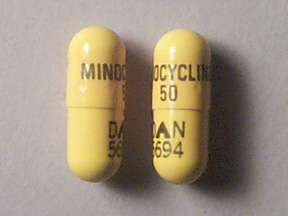
Search
Statistics
We have 222 registered usersThe newest registered user is raheelmemon
Our users have posted a total of 1140 messages in 613 subjects
If you are seeing this, you have attempted to link to the UpToDate widget but are experiencing a problem. Please visit UpToDate for more information.

Minocycline: Therapeutic Potential in Psychiatry ?
FORUM FOR PSYCHIATRY RESIDENTS :: Psychiatry :: Psychiatry-Neurology-Psychology discussion :: Psychiatry In Depth
Page 1 of 1
 Minocycline: Therapeutic Potential in Psychiatry ?
Minocycline: Therapeutic Potential in Psychiatry ?
Minocycline: Therapeutic Potential in Psychiatry
Source: CNS Drugs. 2012 May 1;26(5):391-401

Source: CNS Drugs. 2012 May 1;26(5):391-401

Pharmacological interventions to treat psychiatric illness have previously focused on modifying dysfunctional neurotransmitter systems to improve symptoms. However, imperfect understanding of the aetiology of these heterogeneous syndromes has been associated with poor treatment outcomes for many individuals. Growing evidence suggests that oxidative stress, inflammation, changes in glutamatergic pathways and neurotrophins play important roles in many psychiatric illnesses including mood disorders, schizophrenia and addiction. These novel insights into pathophysiology allow new treatment targets to be explored.
Minocycline is an antibiotic that can modulate glutamate-induced excitotoxicity, and has antioxidant, anti-inflammatory and neuroprotective effects. Given that these mechanisms overlap with the newly understood pathophysiological pathways, minocycline has potential as an adjunctive treatment in psychiatry.
To date there have been promising clinical indications that minocycline may be a useful treatment in psychiatry, albeit from small trials most of which were not placebo controlled. Case reports of individuals with schizophrenia, psychotic symptoms and bipolar depression have shown serendipitous benefits of minocycline treatment on psychiatric symptoms. Minocycline has been trialled in open-label or small randomized controlled trials in psychiatry.
Results vary, with findings supporting use in schizophrenia, but showing less benefit for nicotine dependence and obsessive-compulsive disorder. Given the limited data from rigorous clinical trials, further research is required. However, taken together, the current evidence suggests minocycline may be a promising novel therapy in psychiatry.
 Similar topics
Similar topics» TBI & Psychiatry: Facts
» Q. Which Benzodiazepines Have Least Potential for Drug Interactions?
» Psychiatry: Where are we going?
» Geriatric Psychiatry
» Apps for Psychiatry Residents !!
» Q. Which Benzodiazepines Have Least Potential for Drug Interactions?
» Psychiatry: Where are we going?
» Geriatric Psychiatry
» Apps for Psychiatry Residents !!
FORUM FOR PSYCHIATRY RESIDENTS :: Psychiatry :: Psychiatry-Neurology-Psychology discussion :: Psychiatry In Depth
Page 1 of 1
Permissions in this forum:
You cannot reply to topics in this forum

» L-Methylfolate: Who Will benefit
» Vitamins & Supplements in Clinical Practice.
» Imaging Biomarkers for Outcomes in Mild TBI
» Q.5 Clozapine Neutopenia
» Treating Disorders!
» Cortical Abnormalities in Adults & Adolescents with MDD
» Efficacy of Antipsychotics in Pediatric Acute Mania
» Obsessive Compulsive Disorder in Adults: Which Treatment is Better?